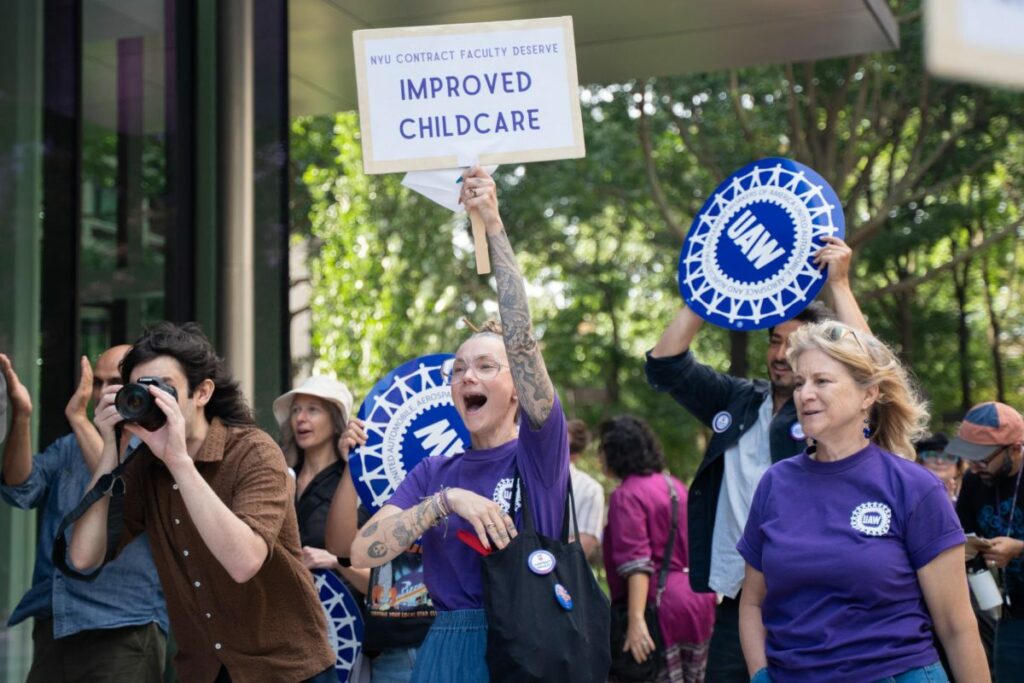NYU relies on contract faculty far more than the private universities it considers peers. CFU-UAW’s collective bargaining agreement must reflect that reality.

Elisabeth Fay is a clinical associate professor in CAS, and an elected member of CFU-UAW’s Bargaining Committee.
My union, Contract Faculty United – United Auto Workers, has been in contract negotiations with the NYU administration for over a year. In recent bargaining sessions, their lawyers have called our demands unrealistic, pointing to union contracts for full-time, non-tenure-track professors at other institutions. They claim we’re asking for higher salaries and better benefits than unionized contract faculty at Skidmore College, Wellesley College, Tufts University, Boston University, Barnard College, Fordham University or the University of Chicago. The administration’s claims are misleading.
Many of these institutions are in smaller cities with a lower cost of living, and more than half are not NYU’s self-reported “peers”, or private universities similar in size and mission. The three that remain are inappropriate comparators: collective bargaining agreements for contract faculty at Tufts, BU and UChicago clearly show that their jobs are structured differently from ours. CFU-UAW’s demands in bargaining reflect the unique role of contract faculty at NYU, and are informed by a much more appropriate point of comparison: our tenured colleagues.
The most obvious difference between us and our unionized contract faculty counterparts at peer institutions is in our numbers. At Tufts and BU, there are only a few hundred, a fraction of the faculty. UChicago employs more than 500 — but next to us, they still look small. There are nearly 1,000 unionized contract faculty at NYU. We are half the full-time professors, and CFU-UAW is the largest full-time faculty union at any private U.S. university.
Our work also sets us apart from contract faculty at other institutions, who are hired primarily to teach, unlike their tenure-track colleagues, who have additional research and service obligations. At NYU, the distinctions between tenure-track and contract faculty are much less clear. Some contract faculty are primarily teachers, but others have the exact same job requirements as tenure-track faculty, and most are somewhere in the middle. Like our tenured colleagues, we participate in academic decision-making through shared governance and serve in administrative roles that support NYU’s research and teaching mission. Most of us maintain active scholarly or artistic practices. We run labs, direct programs, coordinate courses, develop programming, advise students and do hundreds of other essential jobs.
The administration hasn’t always relied so heavily on our labor. NYU used to look more like its peers: most full-time faculty had the security of tenure, and contract professors were the exception, not the rule. Things began to change in 2004, when former NYU president John Sexton announced plans to streamline university operations, putting more power in the hands of administrators and expanding the ranks of non-tenure-eligible faculty. New titles like “arts professor” and “global professor” would make it hard for students to differentiate between contract faculty and tenured faculty, and in many departments, we’d do the same work — but contract faculty would earn less and teach more, and our insecurity would give administrators flexibility to run NYU like a corporation. One Sexton-era dean said the quiet part out loud in an email later uncovered in legal proceedings, when she allegedly instructed her office to fill new contract faculty lines with “people we can abuse, exploit, and then turn loose.”
Under Sexton’s leadership, the composition of NYU’s faculty changed radically. By 2018, the number of contract faculty in CAS had grown by almost 1000%, while the number of tenured faculty had increased by only 43%. These trends have continued: every year, more contract faculty are taking on more responsibilities in our schools, programs and departments.
We came together to form our union because we know that having contingent, overworked faculty in so many crucial roles is bad for everyone at NYU. Tenure confers job security because in a university, academic decisions must be made by faculty experts — not overreaching administrators, donors or politicians. Ongoing attacks on higher education have strengthened our conviction that the administration’s preference for insecure faculty has left us all vulnerable. That’s why we’re demanding fair contract terms to protect the wide range of work we do, as well as improved benefits, compensation and job security to bring us closer to parity with our tenure-track colleagues.
The administration’s lawyers can keep comparing us to contract faculty at Skidmore. CFU-UAW’s Bargaining Committee will stay focused on our tenured peers right here at NYU. President Linda Mills’ vision for our university is not substantially different from John Sexton’s, and we know we’ll have to fight to win a contract that repairs the damage wrought by decades of casualization. We also know that a fairer university is worth fighting for. Our working conditions are students’ learning conditions, and securing our jobs is the best way we know to protect the integrity of the education we offer.
WSN’s Opinion section strives to publish ideas worth discussing. The views presented in the Opinion section are solely the views of the writer.
Contact Elisabeth Fay at opinion@nyunews.com.
